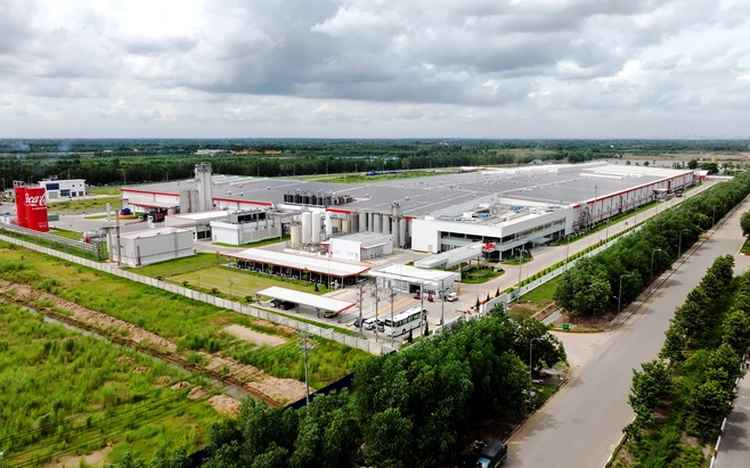
Coca-Cola Vietnam's new factory with a total investment of US$136 million at Phu An Thanh Industrial Park in Ben Luc Commune, Tay Ninh Province, southern Vietnam. Foreign investors view Vietnam as an attractive destination. Photo: D.N.
For years, the international investment community has viewed Vietnam as an appealing destination thanks to its strategic geopolitical location, young workforce, and deep integration into free trade agreements.
However, alongside these advantages, investors continue to raise concerns over institutional bottlenecks, particularly the complexity of administrative procedures.
Among the most significant barriers is the IRC.
The cost of red tape
A major FDI enterprise in southern Vietnam reported that it took nearly two years to adjust its IRC and over three years to complete tax and land-related paperwork.
As a result, the project was frozen, clients withdrew, and investment capital remained idle for years.
This illustrates how burdensome procedures, if not reformed, can kill business opportunities.
According to a July 2025 survey by BW Industrial and YKVN Law Firm involving 88 FDI enterprises, 70.1 percent of respondents said the IRC duplicates the enterprise registration certificate (ERC).
Another 47.1 percent said processing takes at least two months, exceeding the legal time frame of 15–30 days, and 72.4 percent recommended abolishing the IRC entirely.
From the perspective of New Institutional Economics, administrative procedures are a form of transaction cost that businesses must bear.
These costs slow down cash flow, reduce expected profits, and cause significant opportunity losses.
Compared to neighboring countries, Vietnam lags behind in investment procedure timelines.
In Singapore, it takes just one to two days to establish a business entirely online via the BizFile portal.
In Malaysia, the process is completed on the MyCoID platform in three to five days.
Since 2018, Indonesia has operated the Online Single Submission system, allowing investors to complete business formation, registration, and licensing within hours.
This efficiency has helped Indonesia attract tens of billions of U.S. dollars in FDI annually.
In contrast, the IRC remains a mandatory procedure for most projects in Vietnam, extending the market entry period from several months to even years, particularly for projects involving land or infrastructure.
The lack of a national digital 'single-door' system forces businesses to submit documents to multiple agencies, raising costs and damaging Vietnam’s reputation among global corporations that prioritize speed and opportunity cost.
Proposing shifting to post-audit from pre-approval
According to the New Public Management theory, the state should function as a public service provider, focusing on efficiency, transparency, and responsiveness.
This approach has been implemented effectively in China, which has seen high productivity and double-digit growth for many years.
However, the IRC procedure reflects an outdated model of pre-approval governance, relying heavily on paperwork at the start of a project.
This creates a heavy burden on businesses without proportional administrative benefits.
By shifting to post-audit mechanisms—monitoring risks during implementation—the government can reduce licensing burdens while focusing resources on critical areas such as environmental safety, competition, and national security.
It would align Vietnam with international norms and increase its competitiveness in attracting FDI.
Streamlining procedures is more than a matter of saving weeks or months, as it sends a strong political and economic message.
It shows that Vietnam values every investment opportunity, stands with businesses, and is gradually moving toward a transparent, efficient governance model that aligns with global standards.
It is time to decisively eliminate or simplify the IRC and replace it with a more practical project classification mechanism.
For example, large-scale projects involving land or strategic infrastructure would still require investment approval. However, once approved, only an ERC should be needed.
For ordinary projects, procedures could be integrated into ERC procedures, with only a simplified investment registration required in cases involving majority foreign ownership or restricted business lines.
This approach could significantly reduce market entry costs, encourage small and medium enterprises to join supply chains, and still ensure appropriate oversight in sensitive sectors.
In the case of mergers and acquisitions, businesses suggested retaining the current system, which is considered transparent, user-friendly, and legally stable, all highly valued by foreign investors.
If implemented, Vietnam could reduce 70–80 percent of FDI-related procedures, cutting market entry times from months to just days—on par with Singapore and Malaysia and approaching Indonesia’s efficiency.
This is not just technical reform but a clear institutional shift: recognizing businesses as development partners, not subjects of control.
Originally designed to help the state manage investment planning and guide capital flows, IRC has instead become a burden, raising transaction costs and undermining the competitiveness of Vietnam’s investment environment.
How to reform investment procedures
To eliminate the IRC bottleneck, five key solutions are proposed:
- Amend the Investment and Enterprise Laws to harmonize regulations, eliminate duplication between IRC and ERC
- Classify projects by risk level: Maintain control over large-scale or sensitive projects, while allowing streamlined procedures for standard investments
- Accelerate digital transformation with a national electronic single-door system that enables businesses to complete procedures within hours, reducing corruption and improving transparency
- Pilot reforms in key FDI attracting localities like Bac Ninh, Dong Nai, and Ho Chi Minh City to test and scale up the model
- Establish an independent oversight mechanism, involving a cross-sector council with business representation, and publicly report results using clear KPIs on processing time, cost, and satisfaction.
A decisive move on IRC reform would not only unlock resources for businesses but also demonstrate Vietnam’s commitment to institutional reform, moving toward a transparent, competitive, and sustainable investment environment.


Max: 1500 characters
There are no comments yet. Be the first to comment.